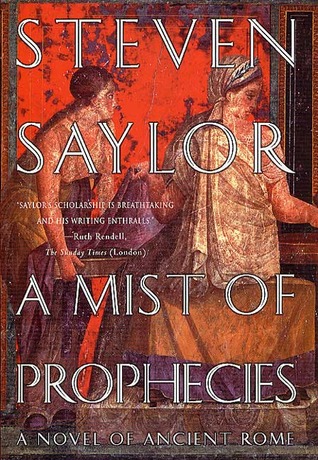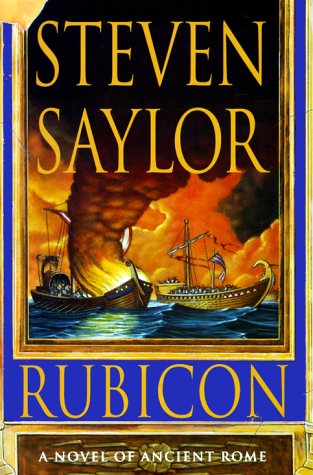I received this book for free from in exchange for an honest review. This does not affect my opinion of the book or the content of my review.

Arms of Nemesis
by
Steven Saylor
It is part of the Roma Sub Rosa #2 series and is a historical mystery in eBook edition that was published by Minotaur Books on January 1, 2001 and has 340 pages.
Explore it on Goodreads or Amazon
Other books in this series include [books_series]
Other books by this author which I have reviewed include Seven Wonders, Catilina's Riddle, The Venus Throw, The House of the Vestals, A Murder on the Appian Way, Rubicon, Last Seen in Massilia, A Mist of Prophecies
Second in the Roma Sub Rosa history mystery series set in Ancient Rome at a time when Spartacus is raging through the countryside, terrifying the populace and revolving around Gordianus, a Finder, who brings his son, Eco, along.
My Take
It’s years after Roman Blood, 1, and much has changed in Gordinaus’ life. He has a son, for one, who follows Gordianus through life — rolling his eyes — even as we follow Gordianus around as he detects — a fascinating education in the politics of the day, slave interactions, the day’s rituals and expectations, and the basics of it apply to today as well.
Saylor sets this tale of ancient Rome beautifully, making me believe I’m there — I can feel the breeze off the sea, the warmth of the baths, taste the food, and fear a man with the power to destroy. A man is who so singleminded, so content with his own theories that he’ll condemn a hundred people to promote his own ambitions while ignoring the truth.
Orata’s business advice is eternal; it’s interesting how eternal human behavior is, no matter the year, country, philosophy…politics, ambition.
I certainly want to slip into the baths at Crassus’ house in Baiae. I fell in love with what Iaia is painting in the baths. I want this mural…
Reading of ancient Rome and their myths makes the Romans come more alive, makes them real people. I do find their funeral rites peculiar what with mimes and poetry about the dead, although it does seem in keeping with the Roman mindset, still I much prefer the Jewish ritual of stories.
I do understand the reasoning behind Crassus’ statement, but there’s something so wrong about his buying and then educating a slave being so much more economical than hiring the services of a professional. And Fabius. He sounds like those idiots who believe that Negroes were of a lesser people, that owning them did them a favor when he talks of slaves not having legends or heroes. When he claims that being slaves, they have no moral character to be free. I find it impossible to believe that anyone can hold such imbecilic thoughts! It turns my stomach.
Interesting side story about Crassus evading certain death from Marius and Cinna by hiding in a Spanish cave.
Yeah, what was Gordianus thinking about to go down to the pier. At night. Alone…? It doesn’t seem like the type of action he would normally take.
I can’t say you’d enjoy the characters in this story: there are only three, maybe four, who have any real honor, but I can say you’ll find it riveting.
The Story
Gordianus is given no chance to say no, and he and Eco sail off to Ancient Rome’s version of the Riviera: Baiae. An important man has died, and an even more important man wants to use this opportunity to further his own political ambitions.
Only, two of the household are determined that justice be done.
The Characters
Gordianus the Finder lives on the Esquiline Hill with his adopted son, Eco, a young mute boy from Roman Blood; Bethesda is still his slave. Belbo is his strongarmer, the house guard.
Marcus Licinius Crassus is one of the wealthiest Romans of his day and determined to ramp up his reputation. Lucius Licinius is/was Crassus’ cousin and in charge of Crassus’ business interests in Baiae. Gelina is his not-too-unhappy widow.
Marcus Mummius is one of Crassus’ protégés with a vested interest in preserving the slaves. Well, one of them. A good military man, Mummius is very sensitive about an ancestor, Mad Mummius. Faustus Fabius is another protégé from an old, but very poor, patrician family.
Meteo is one of the household slaves. Zeno was Lucius’ secretary and accountant while Alexandros had some skill with copying and simple sums although he was technically a stablehand. Apollonius is a beautiful slave who helps in the baths and has the most incredible voice.
Guests at the Villa include:
Iaia Cyzicena is an incredible artist who built her reputation painting portraits. Olympias is her assistant with a huge secret of her own. Iaia has a small villa in Cumae, but frequently stay overnight with Gelina. Sergius Orata is a builder of baths, including the incredible ones in the villa. Metrobius is a female impersonator and an old friend of Sulla’s…and Gelina’s. Dionysius is the resident Stoic philosopher, and an excellent lesson in not brown-nosing.
The Sibyl of Cumae “is an oracle in the Eastern sense”, who speaks through her priestesses. Pompey is busy with an army in Spain.
The Cover and Title
The cover is gorgeous: a red and gold fresco with a Greek key border separating the primary picture of three people engaging in separate actions from the upper border of painted panels.
The title is Gordianus, for he is the Arms of Nemesis.


















